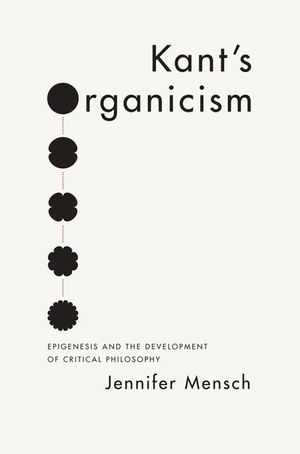Kant's Organicism
Published by The University of Chicago Press
“A striking and radical rereading of [Kant’s first Critique] through the concept of epigenesis . . . Mensch’s reading is bold and innovative.” —Radical Philosophy
The towering achievement of Immanuel Kant’s Critique of Pure Reason has long overshadowed his other interests in natural history and the life sciences, which were considered separate from his theoretical philosophy—until now. In Kant’s Organicism, Jennifer Mensch draws a crucial link between these spheres by showing how the concept of epigenesis—a radical theory of biological formation—lies at the heart of Kant’s conception of reason.
As Mensch argues, epigenesis was not simply a metaphor for Kant but centrally guided his critical philosophy, especially the relationship between reason and the categories of the understanding. Offsetting a study of Kant’s highly technical theory of cognition with a mixture of intellectual history and biography, Mensch situates the epigenesis of reason within broader investigations into theories of generation, genealogy, and classification, and against later writers and thinkers such as Goethe and Darwin.
Distilling vast amounts of research into a concise and accessible book, Mensch offers one of the most refreshing looks not only at Kant’s famous first Critique but at the history of philosophy and the life sciences as well.
The towering achievement of Immanuel Kant’s Critique of Pure Reason has long overshadowed his other interests in natural history and the life sciences, which were considered separate from his theoretical philosophy—until now. In Kant’s Organicism, Jennifer Mensch draws a crucial link between these spheres by showing how the concept of epigenesis—a radical theory of biological formation—lies at the heart of Kant’s conception of reason.
As Mensch argues, epigenesis was not simply a metaphor for Kant but centrally guided his critical philosophy, especially the relationship between reason and the categories of the understanding. Offsetting a study of Kant’s highly technical theory of cognition with a mixture of intellectual history and biography, Mensch situates the epigenesis of reason within broader investigations into theories of generation, genealogy, and classification, and against later writers and thinkers such as Goethe and Darwin.
Distilling vast amounts of research into a concise and accessible book, Mensch offers one of the most refreshing looks not only at Kant’s famous first Critique but at the history of philosophy and the life sciences as well.
BUY NOW FROM
COMMUNITY REVIEWS

